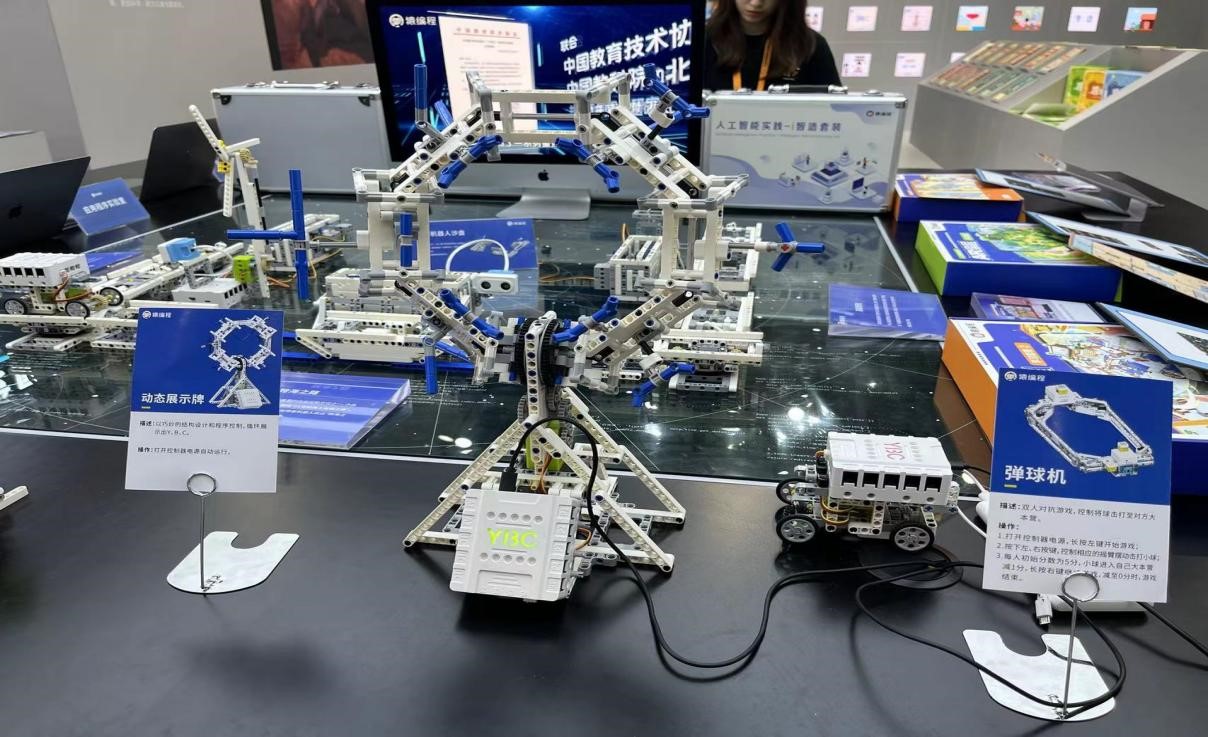【中国国际电视台】EdTech to foster and transform education CIFTIS exhibitors
来源:CGTN
Education technology is a highlight at CIFTIS, the China International Fair for Trade in Services. Exhibitors are showcasing what they believe will transform future education and empower the next generation.

Robot coding models are on display in the pavilion of Education Services at 2023 CIFTIS in Beijing. [Photo: CGTN Radio]
During an Augmented Reality coding course, children immersed themselves in a vibrant three-dimensional cartoon world, embarking on exciting missions to assist animated characters. To succeed, the kids had to arrange motion cards in the correct sequence.
Tailored for young people, this course on display at CIFTIS focuses on nurturing a strong foundation for coding.
Cai Yun with Beijing Yuanli Science and Technology Corporation says the course aims to enhance the mindset of the children.
"As we adults see it, the missions are quite easy. But kids see each mission as a series of separate actions. This means they need to plan and execute each step carefully. Through this process, they develop skills in problem analysis, planning and problem solving. We call it the computational mindset."
As educational technologies evolve, companies are not just using them to improve the learning process, but also trying to optimize teaching efficiency.
AI company iFlytek has developed a cognitive model they call the Chinese version of ChatGPT. Based on the model, they have created a system that helps teachers in lesson planning.
By telling the system what the upcoming lesson is, teachers can instantly receive a teaching outline or slides.
Liu Chang from the company says with such assistance, teachers can devote more energy toward content creation rather than being burdened by repetitive tasks.
"When getting ready for an activity, the system generates a slide structure, and they don't need to make them visually appealing. This allows them to focus on the content and unleash their creativity. Each output from the system is unique."
The company is also presenting its AI learning machine that helps students with drawing, foreign language learning, homework correction and more.
Their smart education products have reached 32 provincial-level regions, with over 1,000 schools in Beijing adopting their technologies.
As advanced education technologies become more prevalent in classrooms, there are concerns regarding their actual impact on education, which may not live up to their impressive appearance.
Liu expressed his confidence, saying that iFlytek boasts a team with extensive teaching experience and a deep understanding of education. The company also collaborates with universities.
"What we are doing is to turn the results of our collaborations with schools and universities into products. We put their theories and techniques into reality so that we can offer better services to teachers and students."
In addition to improving education for children, exhibitors are also presenting technological solutions to enhance college education.
At this year's CIFTIS, the Higher Education Press is showcasing a platform for Virtual Reality courses, and it is encouraging universities to create and share such courses.
Cui Yingnan from the Digital Operations Department says VR courses enable students to experience scenarios that are not feasible in real classrooms or laboratories.
"For instance, conducting experiments on Mars or the Moon in real life is impossible for undergraduates. However, in our VR system, we can simulate these environments, allowing students to do experiments in unique scenarios, such as those with reduced gravity."
So far, more than 600 universities have uploaded about 3500 courses on this platform, attracting over five million users.
Exhibitors are aware of the importance of equal access to education technologies, which often require expensive hardware.
However, they note that the cost of essential equipment like VR glasses is decreasing, and they are partnering with rural schools to introduce simplified versions of their products.
Therefore, they believe that the threshold of using education technologies is getting lower.
